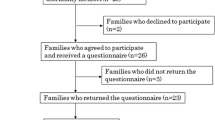Abstract
Background
Posttraumatic stress symptom (PTSS) and posttraumatic growth (PTG) were surveyed in parents of childhood, adolescent and young adult patients with high-grade osteosarcoma.
Methods
A questionnaire survey was performed in parents of patients with osteosarcoma (51 families). The Impact of Event Scale-Revised (IES-R) and posttraumatic growth inventory (PTGI) were employed for the evaluation of PTSS and PTG, respectively. The mean scores were compared with those in preceding studies employing the same scales. In addition, the correlation between the IES-R and PTGI scores was investigated in the parents.
Results
Fifty-eight subjects of 34 families (30 fathers and 28 mothers) replied to the questionnaire. The mean IES-R score in the parents was 18.5, which was higher than that in patients with osteosarcoma (9.7) in our previous study. The mean PTGI score in the parents was 44.9, which was higher than that in university students (33.9) reported by Taku et al. A positive correlation was noted between the IES-R and PTGI scores in the parents.
Conclusions
The PTSS level tended to be higher in the parents rather than in patients with osteosarcoma. The PTG level increased as the PTSS level rose in the parents.
Similar content being viewed by others
References
Horowitz M, Wilner N, Alvarez W (1979) Impact of Event Scale: a measure of subjective stress. Psychosom Med 41:209–218
Barakat LP, Kazak AE, Meadows AT et al (1997) Families surviving childhood cancer: a comparison of posttraumatic stress symptoms with families of healthy children. J Pediatr Psychol 22:843–859
Tedeschi RG, Calhoun LG (1996) The posttraumatic growth inventory: measuring the positive legacy of trauma. J Trauma Stress 9:455–471
Yonemoto T, Ishii T, Takeuchi Y et al (2007) Evaluation of quality of life (QOL) in long-term survivors of high-grade osteosarcoma: a Japanese single center experience. Anticancer Res 27:3621–3624
Yonemoto T, Kamibeppu K, Ishii T et al (2009) Psychosocial outcomes in long-term survivors of high-grade osteosarcoma: a Japanese single-center experience. Anticancer Res 29:4287–4290
Kazak AE, Alderfer M, Rourke MT et al (2004) Posttraumatic stress disorder (PTSD) and posttraumatic stress symptoms (PTSS) in families of adolescent childhood cancer survivors. J Pediatr Psychol 29:211–219
Phipps S, Long A, Hudson M et al (2005) Symptoms of post-traumatic stress in children with cancer and their parents: effects of informant and time from diagnosis. Pediatr Blood Cancer 45:952–959
Barakat LP, Alderfer MA, Kazak AE (2006) Posttraumatic growth in adolescent survivors of cancer and their mothers and fathers. J Pediatr Psychol 31:413–419
Jurbergs N, Long A, Ticona L et al (2009) Symptoms of posttraumatic stress in parents of children with cancer: are they elevated relative to parents of healthy children? J Pediatr Psychol 34:4–13
Michel G, Taylor N, Absolom K et al (2010) Benefit finding in survivors of childhood cancer and their parents: further empirical support for the Benefit Finding Scale for Children. Child Care Health Dev 36:123–129
Asukai N, Kato H, Kawamura N et al (2002) Reliability and validity of the Japanese-language version of the impact of event scale-revised (IES-R-J): four studies of different traumatic events. J Nerv Ment Dis 190:175–182
Taku K, Calhoun LG, Tedeschi RG et al (2007) Examining posttraumatic growth among Japanese university students. Anxiety Stress Coping 20:353–367
Taku K, Cann A, Calhoun LG et al (2008) The factor structure of the posttraumatic growth inventory: a comparison of five models using confirmatory factor analysis. J Trauma Stress 21:158–164
Conflict of interest
No author has any conflict of interest.
Author information
Authors and Affiliations
Corresponding author
About this article
Cite this article
Yonemoto, T., Kamibeppu, K., Ishii, T. et al. Posttraumatic stress symptom (PTSS) and posttraumatic growth (PTG) in parents of childhood, adolescent and young adult patients with high-grade osteosarcoma. Int J Clin Oncol 17, 272–275 (2012). https://doi.org/10.1007/s10147-011-0286-3
Received:
Accepted:
Published:
Issue Date:
DOI: https://doi.org/10.1007/s10147-011-0286-3




